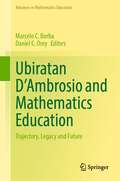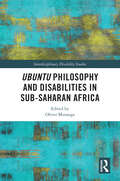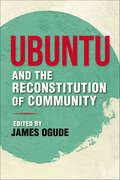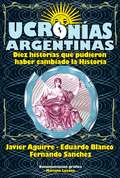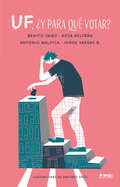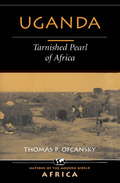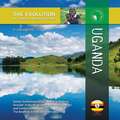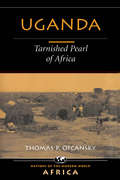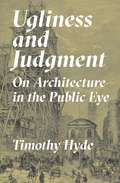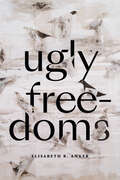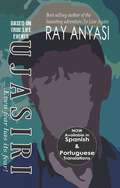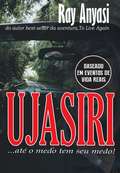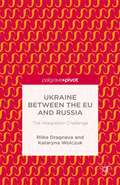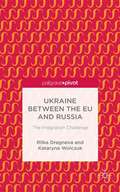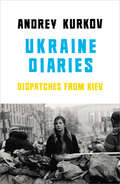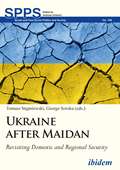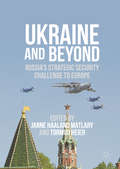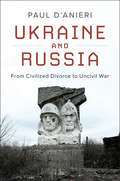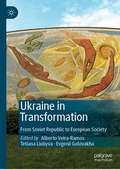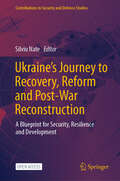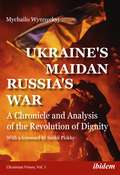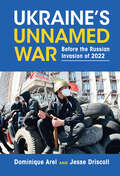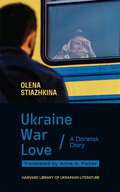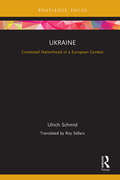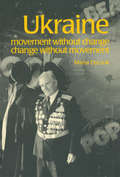- Table View
- List View
Ubiratan D’Ambrosio and Mathematics Education: Trajectory, Legacy and Future (Advances in Mathematics Education)
by Marcelo C. Borba Daniel C. OreyThis edited volume is written in memoriam of Professor Emeritus Ubiratan D’Ambrosio (1932 – 2021), who was a well-known Brazilian mathematics educator and historian of mathematics. This book explores the diverse facets of D’Ambrosio’s work as well as his legacy and the later adaptation of his ideas around the globe.It starts with a preface written by his son, Alexandre D' Ambrosio, who shares his personal experiences growing up with this father and his love for discovery. The book is then divided into four sections:Past and Future: Ubi’s Way of Seeing Education in the PresentRoots of EthnomathematicsEthnomathematics in ActionTrends in Ethnomathematics It features diverse points of view and experiences that explore mathematics and culture from researchers in the Americas, Africa, Europe and South Asia. Chapters range from personal explorations of D’Ambrosio’s impact to broader views of his research and work. This book forms part of the growing understanding of Ubiratan D’Ambrosio’s life, research, and the legacy he has left for millions of researchers, students and teachers worldwide. This book is appealing to anyone involved in mathematics education research as well as those interested in the history and future of mathematics education.
Ubuntu Philosophy and Disabilities in Sub-Saharan Africa (Interdisciplinary Disability Studies)
by Oliver MutangaThis book uses Ubuntu philosophy to illuminate the voices of people with disabilities from Sub-Saharan Africa. Disability literature is largely dominated by scholars and studies from the Global North, and these studies are largely informed by Global North theories and concepts. Although disability literature in the Global South is now fast growing, most studies continue to utilise conceptual, theoretical, and philosophical frameworks that are framed within Global North contexts. This presents two major challenges: Firstly, the voices of people with disabilities in the Global South remain on the fringes of disability discourses. Secondly, when their voices are heard, their realities are distorted. This edited book, consisting of 11 chapters, provides case studies from Botswana, Ghana, Lesotho, Uganda, and South Africa, explores disability in various fields: Inclusive education, higher education, environment, Open Distance Learning, and Technical and Vocational Education and Technical Colleges. The book contributes to the ways in which disability is understood and experienced in the Global South thereby challenging the Western hegemonic discourses on disability. This collection of contributions will be of interest to all scholars and students of disability studies, development studies, medical sociology, and African studies.
Ubuntu and the Reconstitution of Community (World Philosophies)
by Edited by James OgudeUbuntu is premised on the ethical belief that an individual's humanity is fostered in a network of human relationships: I am because you are; we are because you are. The essays in this lively volume elevate the debate about ubuntu beyond the buzzword it has become, especially within South African religious and political contexts. The seasoned scholars and younger voices gathered here grapple with a range of challenges that ubuntu puts forward. They break down its history and analyze its intellectual surroundings in African philosophical traditions, European modernism, religious contexts, and human rights discourses. The discussion embraces questions about what it means to be human and to be a part of a community, giving attention to moments of loss and fragmentation in postcolonial modernity, to come to a more meaningful definition of belonging in a globalizing world. Taken together, these essays offer a rich understanding of ubuntu in all of its complexity and reflect on a value system rooted in the everyday practices of ordinary people in their daily encounters with churches, schools, and other social institutions.
Ucronías Argentinas: Diez historias que pudieron haber cambiado la historia
by Eduardo Blanco Javier Aguirre Fernando SánchezHistoria contrafáctica con el humor de la revista Barcelona. ¿Quéhubiera pasado si....? Quiénes mejor que tres de los creadores de la revista Barcelona paramanipular descaradamente la historia argentina y sus consecuencias. ¿Quéhabría pasado si Carlos Gardel hubiese sobrevivido al accidente de aviónen Medellín? ¿Acaso el Zorzal habría ganado fama de fracasado y mufa? ¿Yqué habría pasado si los negros no hubieran sido exterminados delterritorio argentino? ¿Y si el gol con la mano de Maradona a losingleses hubiera sido anulado? ¿Y si Manuel Belgrano hubiese creado labandera patria un día en que caían soretes de punta?«Este libro se pregunta "¿Qué hubiera pasado si..?" por ejemplo, siBergoglio hubiera sido elegido Papa, si Evita se hubiera vuelto gorila,o si los Montoneros hubieran ganado. A primera vista, parece un librointeligente y divertido. Y ciertamente lo es. Pero en una segundalectura se revela también absolutamente esclarecedor. Ocurre queefectivamente Evita fue gorila, Bergoglio fue elegido Papa y losMontoneros ganaron (solo que todavía no nos dimos cuenta)». DamiánTabarovsky
Uf, ¿y para qué votar?
by Rosa Beltrán Benito Taibo Antonio Malpica Jorge Vargas B.¿Te choca la política? ¿Acabas de cumplir 18? ¿Para qué te sirve la credencial de elector además de que te dejen entrar a los antros? El Instituto Nacional Electoral ha reunido a entrañables escritores que te cuentan en este libro sus experiencias con la democracia, cómo ha influido en su vida cotidiana y en su forma de ver el mundo, pues la idea de pactar entre todos funciona en el día a día y desde tiempos ancestrales. Mucha gente se siente decepcionada, hay quienes consideran no votar y regalan su poder de decisión a los demás. Pero la desesperanza te inmoviliza, y es justo ahí donde lo que no nos gusta surge con más fuerza. Además, para lograr lo que queremos en la vida personal se necesitan buenas condiciones en la vida pública. Por eso es vital que ejerzas tu derecho a decidir. Que tu voz sea escuchada. Sobretodo tomando en cuenta lo que de veras importa en la comunidad. Participar vale la pena porque significa apostarle a solucionar nuestros conflictos y porque la voluntad es el motor de la historia. No te dejes llevar por el sentimentalismo ni por la víscera entre bandos, aun a pesar de que sea precisamente ese fuego emotivo al que por desgracia se le arroja más combustible en casi todas las campañas electorales. Tampoco te apantalles con los anuncios que apuestan por el miedo y el desencanto, ni siquiera por los que pretenden ser inspiradores. La reflexión es lo que cuenta. Ilustraciones de Santiago Solís
Uganda
by Thomas P OfcanskyUganda, a landlocked nation in East Africa, was known during colonial times as the "Pearl of Africa," largely because of its pleasant climate and rich land. For most of the postindependence period, however, Uganda was one of the most brutal and violent nations in Africa. In 1986, a new government seized power, promising to restore internal stability and economic prosperity. Since then, Uganda has gradually become a model for other African states struggling to improve the lives of their citizens. In this broad survey, Thomas P. Ofcansky examines the political, economic, and social themes that have shaped Ugandan history. He inspects the impact of British colonial rule, investigates the emergence of the independence movement after World War II, and analyzes the factors that contributed to the collapse and decay of Ugandan society after Idi Amin's seizure of power in 1971. The author then explores the successes, failures, and prospects of Uganda's current government. In his conclusion, Ofcansky considers the difficulties facing a nation divided by ethnic, religious, and regional cleavages and argues that Ugandan leaders must work to establish a society in which all Ugandans benefit or face the possibility of a return to anarchy.
Uganda (The Evolution of Africa's Major Nations)
by Lauri KubuitsileUganda is sometimes called the "land of lakes," because almost one-third of its territory is covered by water. The greatest Ugandan body of water is Lake Victoria, the second-largest freshwater lake in the world. The world's longest river, the Nile, also has its source in Uganda. Uganda has faced a great deal of turmoil since becoming independent in 1962. During the rule of Idi Amin in the 1970s, some 300,000 Ugandans--mostly from the Acholi and Lano tribes--were massacred. Political instability and unrest in the country continued into the next decade. However, since the 1986 election of Yoweri Museveni, Uganda has made great progress socially and economically. In recent years the country has forged closer ties with the United States and other foreign nations.
Uganda: Tarnished Pearl Of Africa (Nations of the Modern World: Africa)
by Thomas P OfcanskyUganda, a landlocked nation in East Africa, was known during colonial times as the ?Pearl of Africa,? largely because of its pleasant climate and rich land. For most of the postindependence period, however, Uganda was one of the most brutal and violent nations in Africa. In 1986, a new government seized power, promising to restore internal stability and economic prosperity. Since then, Uganda has gradually become a model for other African states struggling to improve the lives of their citizens.In this broad survey, Thomas P. Ofcansky examines the political, economic, and social themes that have shaped Ugandan history. He inspects the impact of British colonial rule, investigates the emergence of the independence movement after World War II, and analyzes the factors that contributed to the collapse and decay of Ugandan society after Idi Amin's seizure of power in 1971. The author then explores the successes, failures, and prospects of Uganda's current government. In his conclusion, Ofcansky considers the difficulties facing a nation divided by ethnic, religious, and regional cleavages and argues that Ugandan leaders must work to establish a society in which all Ugandans benefit or face the possibility of a return to anarchy.
Ugliness and Judgment: On Architecture in the Public Eye
by Timothy HydeA novel interpretation of architecture, ugliness, and the social consequences of aesthetic judgmentWhen buildings are deemed ugly, what are the consequences? In Ugliness and Judgment, Timothy Hyde considers the role of aesthetic judgment—and its concern for ugliness—in architectural debates and their resulting social effects across three centuries of British architectural history. From eighteenth-century ideas about Stonehenge to Prince Charles’s opinions about the National Gallery, Hyde uncovers a new story of aesthetic judgment, where arguments about architectural ugliness do not pertain solely to buildings or assessments of style, but intrude into other spheres of civil society.Hyde explores how accidental and willful conditions of ugliness—including the gothic revival Houses of Parliament, the brutalist concrete of the South Bank, and the historicist novelty of Number One Poultry—have been debated in parliamentary committees, courtrooms, and public inquiries. He recounts how architects such as Christopher Wren, John Soane, James Stirling, and Ludwig Mies van der Rohe have been summoned by tribunals of aesthetic judgment. With his novel scrutiny of lawsuits for libel, changing paradigms of nuisance law, and conventions of monarchical privilege, he shows how aesthetic judgments have become entangled in wider assessments of art, science, religion, political economy, and the state.Moving beyond superficialities of taste in order to see how architectural improprieties enable architecture to participate in social transformations, Ugliness and Judgment sheds new light on the role of aesthetic measurement in our world.
Ugly Freedoms
by Elisabeth R. AnkerIn Ugly Freedoms Elisabeth R. Anker reckons with the complex legacy of freedom offered by liberal American democracy, outlining how the emphasis of individual liberty has always been entangled with white supremacy, settler colonialism, climate destruction, economic exploitation, and patriarchy. These “ugly freedoms” legitimate the right to exploit and subjugate others. At the same time, Anker locates an unexpected second type of ugly freedom in practices and situations often dismissed as demeaning, offensive, gross, and ineffectual but that provide sources of emancipatory potential. She analyzes both types of ugly freedom at work in a number of texts and locations, from political theory, art, and film to food, toxic dumps, and multispecies interactions. Whether examining how Kara Walker’s sugar sculpture A Subtlety, Or the Marvelous Sugar Baby reveals the importance of sugar plantations to liberal thought or how the impoverished neighborhoods in The Wire blunt neoliberalism’s violence, Anker shifts our perspective of freedom by contesting its idealized expressions and expanding the visions for what freedom can look like, who can exercise it, and how to build a world free from domination.
Ujasiri
by Ray Anyasiinteresante historia que mantendra pegado a cualquier lector. hasta el ultimo capitulo pues el reclamo de la historia es apasionante y no tiene nada que ver con otras cosas que hayas keido anteriormente. Aparte la historia te hace sentir como si estubieras en una escena dentro del mismo libro por lo que se vuelve mas y mas interesante cada vez que fluye la trama.
Ujasiri: Ujasiri
by Ray AnyasiUm ex-soldado tenta resgatar sua esposa e filho do campo de morte de Joseph Kony e sua gangue. Com base em eventos reais da vida, em 2010, Joseph Dahr, um ex-soldado de meia-idade tenta resgatar do LRA sua esposa e filho que são sequestrados de sua aldeia no leste da República Democrática do Congo, tudo o que ele tem é um rifle enferrujado que pode usar e um velho amigo em quem ele pode confiar. Dahr acredita que Rosa e Joe Junior não teriam sido sequestrados se ele os tivesse levado para Kinshasa como Rosa implorou. Ele, portanto, não se perdoaria a menos que os trouxesse para casa por qualquer meio. Ele resumiu sua missão em um diálogo com Hussein assim: “Eu não sou um idiota. Eu conheço os perigos do que estou prestes a fazer, mas é a única maneira de viver comigo mesmo. ” Ele confia em Hussein, um espião americano, para armá-lo com todos os detalhes sobre o modo de operação do LRA. Hussein sozinho tem o que considera um plano perfeito para acabar com Kony, mas acredita que seus superiores no Pentágono não o aceitariam. Ele decide que se juntar a Dahr é o caminho a seguir. Ao longo do caminho de reunir inteligência e materiais para seu grande confronto com o LRA, Dahr conhece e inspira vários outros homens que também têm motivos pessoais para lutar contra o LRA. Conseqüentemente, o fardo de liderar um exército de homens perturbados enquanto mantém os olhos no objetivo agora deve ser adicionado a seus muitos problemas.
Ukraine Between the EU and Russia: The Integration Challenge
by R. Dragneva-Lewers K. WolczukThis book addresses the complex origins of the Ukrainian crisis. It places the crisis in a longer-term perspective and shows how the domestic political regime interpreted, balanced and eventually chose between the competing integration offers of Russia and the EU. It also explores the key implications for Ukraine's relations with the EU and Russia.
Ukraine Between the EU and Russia: The Integration Challenge
by Rilka Dragneva Kataryna WolczukUkraine Between the EU and Russia.
Ukraine Diaries: Dispatches From Kiev
by Andrey KurkovAcclaimed author Andrey Kurkov gives powerful insight into life in Kyiv following the 2013 protests and before the 2022 Russian invasion.-16°C, sunlight, silence. I drove the children to school, then went to see the revolution. I walked between the tents. Talked with revolutionaries. They were weary today. The air was thick with the smell of old campfires. Ukraine Diaries is acclaimed writer Andrey Kurkov's first-hand account of the ongoing crisis in his country. From his flat in Kyiv, just five hundred yards from Independence Square, Kurkov can smell the burning barricades and hear the sounds of grenades and gunshot. Kurkov's diaries begin on the first day of the pro-European protests in November 2013, and describe the violent clashes in the Maidan, the impeachment of Yanukovych, Russia's annexation of Crimea and the separatist uprisings in the east of Ukraine. Going beyond the headlines, they give vivid insight into what it's like to live through - and try to make sense of - times of intense political unrest, on the path to the current crisis.
Ukraine after Maidan: Revisiting Domestic and Regional Security (Soviet and Post-Soviet Politics and Society #188)
by George Soroka Tomasz StȩpniewskiWhen public protests first began in Ukraine at the end of 2013, the failed promise of the Orange Revolution was still fresh in the minds of many Ukrainians. However, unlike in the aftermath of 2004-2005, the political and military crises ignited by the Euromaidan brought profound changes not only for Ukraine, but also for neighboring states and Europe more generally. The annexation of Crimea by Russia in March 2014, along with the outbreak of fighting in the Donets Basin, has resulted in a profound shift in how domestic and regional security is perceived. More broadly, these events have also called into question the durability of the post-Cold War world order, which had been based upon peaceful coexistence between states, the integrity of sovereign borders, and an acceptance of the legitimacy of international law. While the effects of the Euromaidan have already been analyzed in terms of Ukrainian politics and relations between Ukraine, Russia, and the EU, what has not yet taken place is a sustained analysis of how its legacies have reverberated throughout the post-communist region and wider Europe (and how these altered international perceptions have, in turn, affected the subsequent course of Ukraine’s domestic politics). Writing from a variety of viewpoints and backgrounds, this volume’s contributors seek to address these lacunae. Among other topics, they focus on Russia’s dissatisfaction with the post-Cold War international order, examine issues of ontological insecurity in an increasingly networked world, assess the limits of Western leverage, evaluate Ukrainian public opinion concerning NATO and the EU, consider the broader security implications of the Euromaidan for Eastern Europe, explore the role of migration and demographic factors for Ukrainian security, and assess how contentious pasts are being utilized as tools of statecraft by both Ukrainian actors and outside forces.
Ukraine and Beyond
by Janne Haaland Matlary Tormod HeierThis book is the first full-spectrum analysis of Russian and European norms of political action, ranging from international law, ethics, and strategy, to the specific norms for the use of force. It brings together leading scholars from these various fields, examining the differences in norm understanding between Russia and Europe. In light of the 2014 occupation and annexation of Crimea by Russia, and its subsequent covert participation in the internal affairs of Ukraine, including aggressive flying and major military exercises, Russia seems to be a classical revisionist power, intent on changing the balance of power in Europe in particular. It also reaches beyond Europe, inserting itself as the key actor in the Syrian war. The book therefore considers how we should understand Russia. It also questions whether or not the West, in particular Europe, responds adequately in this delicate and dangerous new situation. The book concludes that at present Russia acts strategically and with considerable success whereas Europe is reactive in its response.
Ukraine and Russia: From Civilied Divorce to Uncivil War
by Paul D'AnieriD'Anieri explores the dynamics within Ukraine, between Ukraine and Russia, and between Russia and the West, that emerged with the collapse of the Soviet Union and eventually led to war in 2014. Proceeding chronologically, this book shows how Ukraine's separation from Russia in 1991, at the time called a 'civilized divorce', led to what many are now calling 'a new Cold War'. He argues that the conflict has worsened because of three underlying factors - the security dilemma, the impact of democratization on geopolitics, and the incompatible goals of a post-Cold War Europe. Rather than a peaceful situation that was squandered, D'Anieri argues that these were deep-seated pre-existing disagreements that could not be bridged, with concerning implications for the resolution of the Ukraine conflict. The book also shows how this war fits into broader patterns of contemporary international conflict and should therefore appeal to researchers working on the Russia-Ukraine conflict, Russia's relations with the West, and conflict and geopolitics more generally.
Ukraine in Transformation: From Soviet Republic to European Society
by Alberto Veira-Ramos Tetiana Liubyva Evgenii GolovakhaThis edited collection provides a comprehensive overview of the major changes and transformations in Ukrainian society, from its independence in 1991, through to 2018. Based on solid empirical quantitative data generated by local institutions such as the monitoring survey Ukrainian Society, produced by the Institute of Sociology of National Academy of Sciences of Ukraine (IS NASU), the contributions explore transitions in values, occupational structure, education, inequality, religiosity, media, and identity, as well as the impact of the “Revolution of Dignity” (Euromaidan) and the Donbas conflict. Covering more than 25 years of Ukrainian history and complemented by qualitative research carried out by authors, Ukraine in Transformation will be invaluable to upper level students and researchers of sociology, political science, international relations and cultural studies, with a particular interest in post-Soviet Eastern Europe.
Ukraine's Journey to Recovery, Reform and Post-War Reconstruction: A Blueprint for Security, Resilience and Development (Contributions to Security and Defence Studies)
by Silviu NateThis open access volume explores Ukraine's challenges post-war, focusing on economic revival and sustainable development. Addressing scholars, policymakers, and practitioners the book discusses pivotal issues for the rebuilding of Ukraine, such as institutional changes, economic hurdles, social stability, and environmental rejuvenation. The book highlights the inevitable need for Ukraine's institutional transformation, essential for EU and NATO integration. It goes on to examine the global geopolitical and economic repercussions and emphasizes the pivotal role of energy independence in the European landscape. Through a multi-disciplinary lens encompassing political science, economics, and law, this book provides evidence-based insights and policy recommendations. Offering a comprehensive presentation of post-war challenges, it offers an invaluable guide for policymakers and practitioners interested in the complexities of Ukraine's reconstruction. This is an open access book.
Ukraine's Maidan, Russia's War: A Chronicle and Analysis of the Revolution of Dignity (Ukrainian Voices #1)
by Mychailo WynnyckyjIn early 2014, sparked by an assault by their government on peaceful students, Ukrainians rose up against a deeply corrupt, Moscow-backed regime. Initially demonstrating under the banner of EU integration, the Maidan protesters proclaimed their right to a dignified existence; they learned to organize, to act collectively, to become a civil society. Most prominently, they established a new Ukrainian identity: territorial, inclusive, and present-focused with powerful mobilizing symbols.Driven by an urban “bourgeoisie” that rejected the hierarchies of industrial society in favor of a postmodern heterarchy, a previously passive post-Soviet country experienced a profound social revolution that generated new senses: “Dignity” and “fairness” became rallying cries for millions. Europe as the symbolic target of political aspiration gradually faded, but the impact (including on Europe) of Ukraine’s revolution remained. When Russia invaded—illegally annexing Crimea and then feeding continuous military conflict in the Donbas—Ukrainians responded with a massive volunteer effort and touching patriotism. In the process, they transformed their country, the region, and indeed the world. This book provides a chronicle of Ukraine’s Maidan and Russia’s ongoing war, and puts forth an analysis of the Revolution of Dignity from the perspective of a participant observer.
Ukraine's Unnamed War: Before the Russian Invasion of 2022
by Jesse Driscoll Dominique ArelThe Russian invasion of Ukraine in 2022 has its roots in the events of 2013–2014. Russia cynically termed the seditionist conflict in Crimea and Eastern Donbas a 'civil war' in order to claim non-involvement. This flies in the face of evidence, but the authors argue that the social science literature on civil wars can be used help understand why no political solution was found between 2015 and 2022. The book explains how Russia, after seizing Crimea, was reacting to events it could not control and sent troops only to areas of Ukraine where it knew it would face little resistance (Eastern Donbas). Kremlin decisionmakers misunderstood the attachment of the Russian-speaking population to the Ukrainian state and also failed to anticipate that their intervention would transform Ukraine into a more cohesively 'Ukrainian' polity. Drawing on Ukrainian documentary sources, this concise book explains these important developments to a non-specialist readership.
Ukraine, War, Love: A Donetsk Diary (Harvard Library of Ukrainian Literature #7)
by Olena StiazhkinaIn Ukraine, War, Love, Olena Stiazhkina depicts day-to-day developments in and around her beloved hometown Donetsk during Russia’s 2014 invasion and occupation of the Ukrainian city. An award-winning fiction writer, Stiazhkina chronicles an increasingly harrowing series of events with sarcasm, anger, humor, and love.The diary opens on March 2, 2014, as the first wave of pro-Russian protest washes over eastern Ukraine in the wake of Euromaidan, the Revolution of Dignity, and it closes on August 18, 2014, the day a convoy of civilian Ukrainian refugees is deliberately slaughtered by Russian forces. Early on, Stiazhkina is captured by pro-Russian forces while she browses for books but is freed when one of her captors turns out to be a former student. Vignettes from her personal life intermingle with current events, and she examines ordinary people in extraordinary circumstances. We walk with local dogs and their owners; we meet a formidable apartment building manager who shames occupiers and dismantles their artillery from the roof of her building; we follow a family evacuated to Kyiv whose young son builds checkpoints out of Legos. Olena Stiazhkina’s Ukraine, War, Love: A Donetsk Diary is a fierce love letter to her country, her city, and her people.
Ukraine: Contested Nationhood in a European Context (Europa Country Perspectives)
by Ulrich SchmidUkraine: Contested Nationhood in a European Context challenges the common view that Ukraine is a country split between a pro-European West and a pro-Russian East. The volume navigates the complicated cultural history of Ukraine and highlights the importance of regional traditions for an understanding of the current political situation. A key feature is the different politics of memory that prevail in each region, such as the Soviet past being presented as either a foreign occupation or a benign socialist project. The pluralistic culture of Ukraine (in terms of languages, national legacies and religions) forms a nation that faces both internal and external challenges. In order to address this fully, rather than following a merely chronological order, this book examines different interpretations of Ukrainian nationhood that have been especially influential, such as the Russian tradition, the Habsburg past and the Polish connections. Finally, the book analyses Ukraine’s political and economic options for the future. Can the desired integration into EU structures overcome the concentration of investment of power in the hands of a few oligarchs and a continuing widespread culture of corruption? Will proposals to join NATO, which garnered robust support among the populace in the aftermath of the Russian aggression, materialise under the current circumstances? Is the political culture in Ukraine sufficiently functional to guarantee democratic procedures and the rule of law?
Ukraine: Movement without Change, Change without Movement (Postcommunist States and Nations #Vol. 5)
by Marta DyczokUkraine has surprised many international observers. Few anticipated its declaration of independence in 1991 or its determination to move out of Russia's shadow. Dyczok redresses the continuing dearth of information on the country. Aimed at nonspecialists and specialists alike, it presents an overview of the main government policies, and the social and cultural issues facing the new state. These are placed within their historical, regional and global framework. In contrast with the generally bleak picture that international media reports present, the book suggests that Ukraine has actually accomplished a great deal in a short time. In seven years, from 1991 to 1998, Ukraine went from being a little-known nation within a non-democratic state to an internationally recognized independent country. During this period of change, it contributed to the geopolitical shift which occurred with the implosion of the Soviet Union. As such, it may be argued, Ukraine has a role to play in the search for the new international order.
